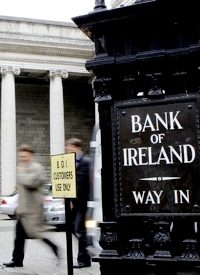
Ireland is one of many nations within the European Union that faces profound doubts about its ability to maintain its financial credibility. During the last several days, ministers of the European Union have tried to cobble together a rescue package that would allow the beleaguered country to manage its public debt.
“Outside funding” is the standard phrase to describe what the Irish government needs. Otherwise, the wobbliness of its currency and government debt will push its government bonds into higher and higher interest rates, to cover the problems of potential default and inflation.
Where exactly this “outside funding” might come from, however, is unsure. Already, European nations such as Greece, Spain, Italy, Portugal, and Iceland are all facing crises of confidence based on the explosion of public debt and liability, especially in the “off-limits” categories such as government pensions. For almost a century, demographic trends in Europe have suggested that the continent is graying relentlessly and that those of retirement ages that do not reflect actuarial reality are ultimately doomed. Many countries have tried to solve this problem by allowing the immigration of large numbers of alien populations — particularly angry young Muslims who are largely unemployed; and while this makes the population younger, on paper, it will not solve the problem of productive citizens retiring early. The present turmoil in France over a modest rise in the early retirement age is a dark warning of what the other countries of Europe (as well as the U.S.) will face in pubic retirement and social security programs.
The Irish government itself, however, insists it does not need a bailout and that an austerity budget, due in early December, will demonstrate that. Investors do note distinctions between the crisis in Greece and the pending crisis in Ireland: the Irish government has produced real numbers about its debt, its negative economic growth, and its revenue. In contrast, the Greek government concealed the severity of its problem until emergency outside help was the only option to prevent total collapse of the country’s economy. Adding to the general mistrust, the European Union has just revised upward the Greek national deficit for 2009 from 13.6 percent of GDP to 15.4 percent of GDP, a troubling sign for investors.
If a bailout of Ireland becomes necessary, then Germany, the 800-pound gorilla in European economic affairs, may show increasing frustration with its union partners. The German government was especially unhappy about the Greek bailout. The Irish government itself, which has a very shaky parliamentary coalition, is skittish about anything resembling a bailout, which might stigmatize Ireland and its government in the eyes of investors and, also, voters in an early election widely anticipated. But in spite of tension between Germany and more debt-ridden governments, and the political problems the Irish government faces, there already have been preliminary talks about a rescue package, although European Union officials are quick to note that Ireland has not formally applied for a bailout.
Whatever happens, Ireland faces truly daunting long-term problems. The four-year plan being developed in Dublin would reduce the current national deficit from 32 percent to only 3 percent by 2014. This would demand another round of spending cuts while Ireland is staggering from a third consecutive year of negative growth in the economy. Yet while speculation continues, the yield on government bonds required to finance pubic debt had risen to 9 percent by last week, a return which would seem unsustainable for the Irish government in the long term.
Only four years ago, Ireland was hailed as the “Celtic Tiger,” welcoming business and talented immigrants to make their home in the Emerald Isle. Now it is seeking help from its neighbors just to stay afloat. The question is: What happens when those neighbors start sinking too? No one seems to have an answer.



